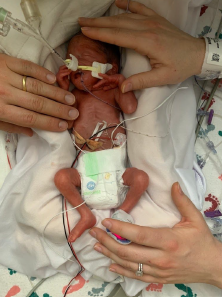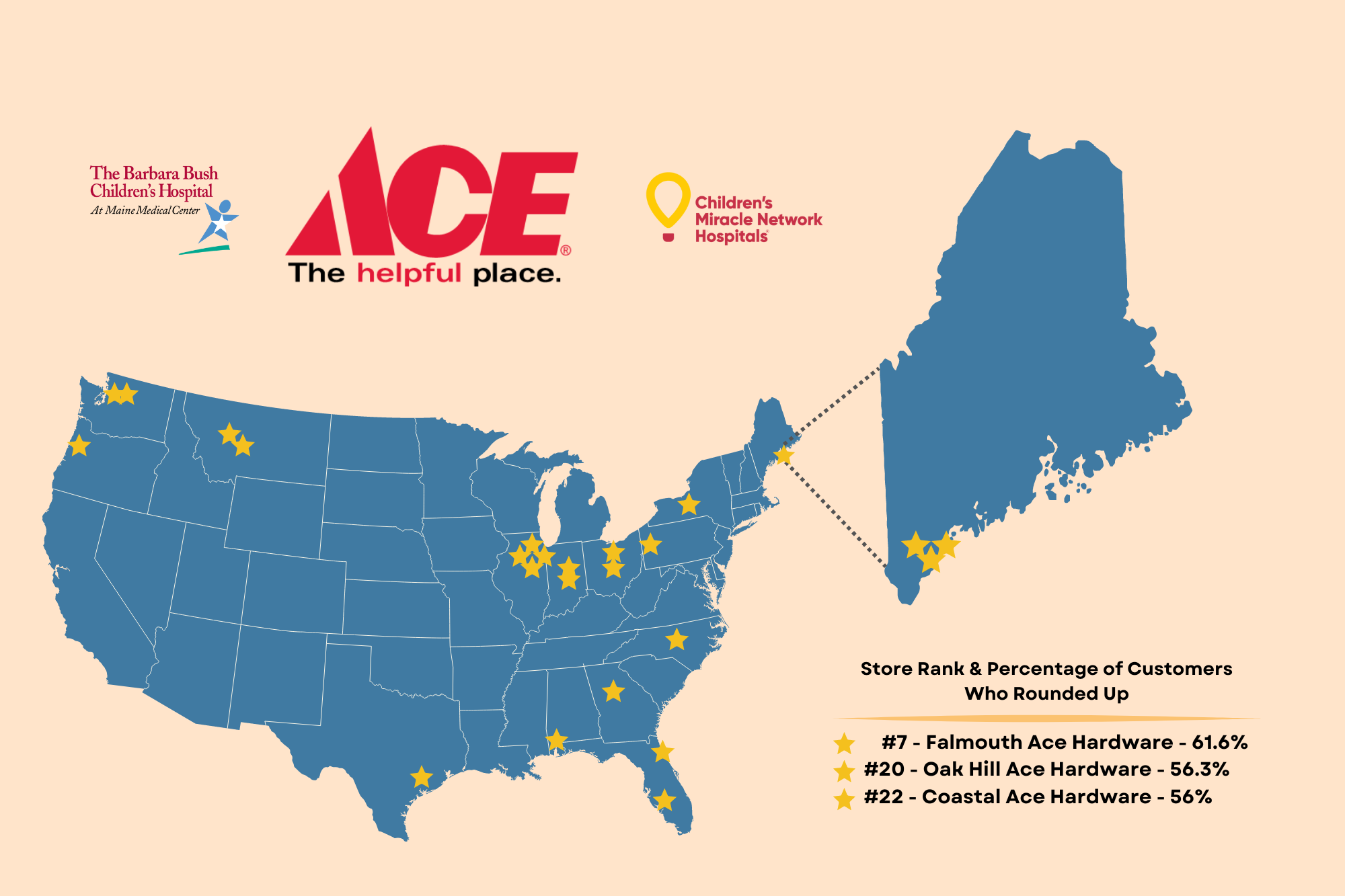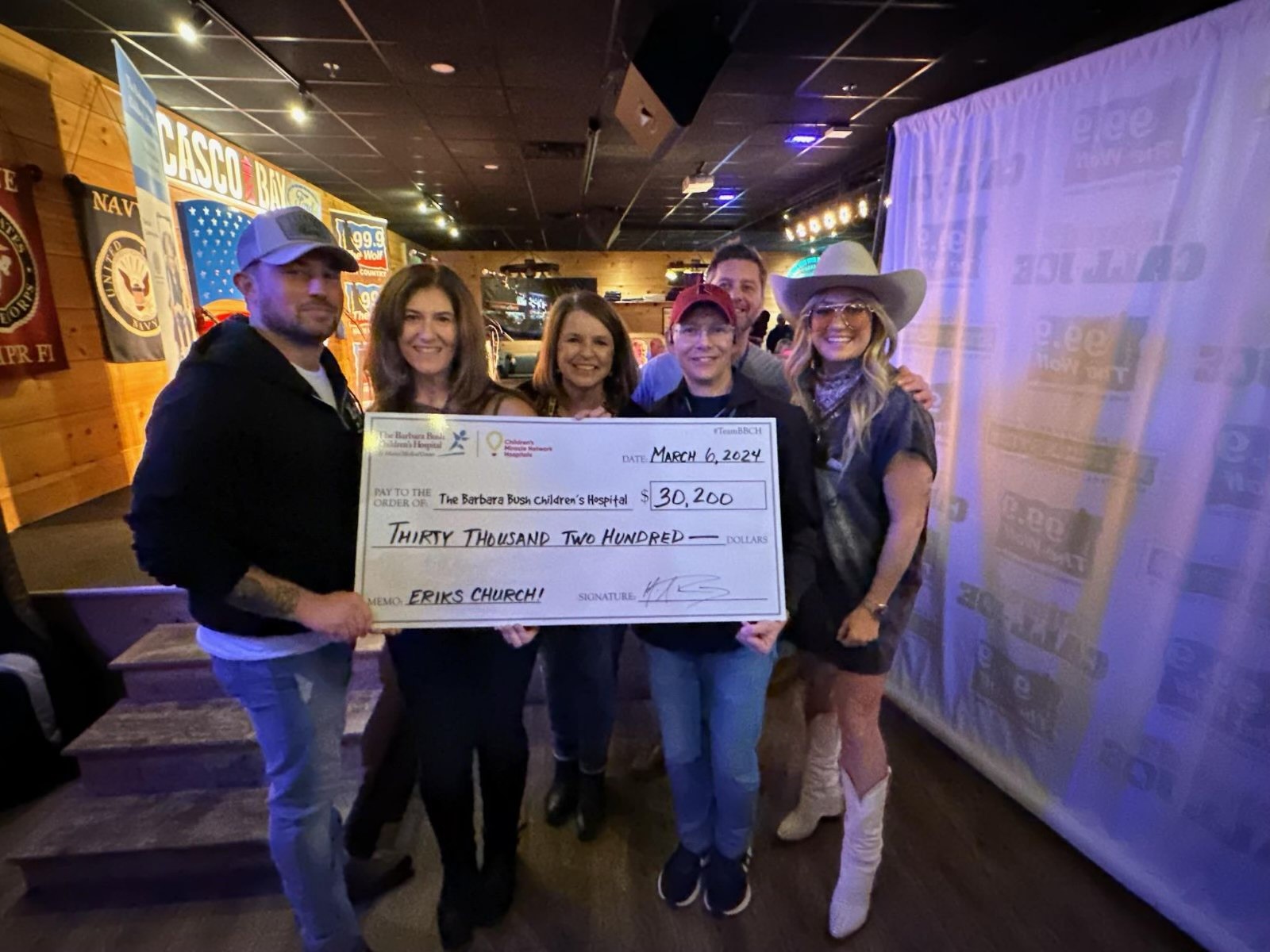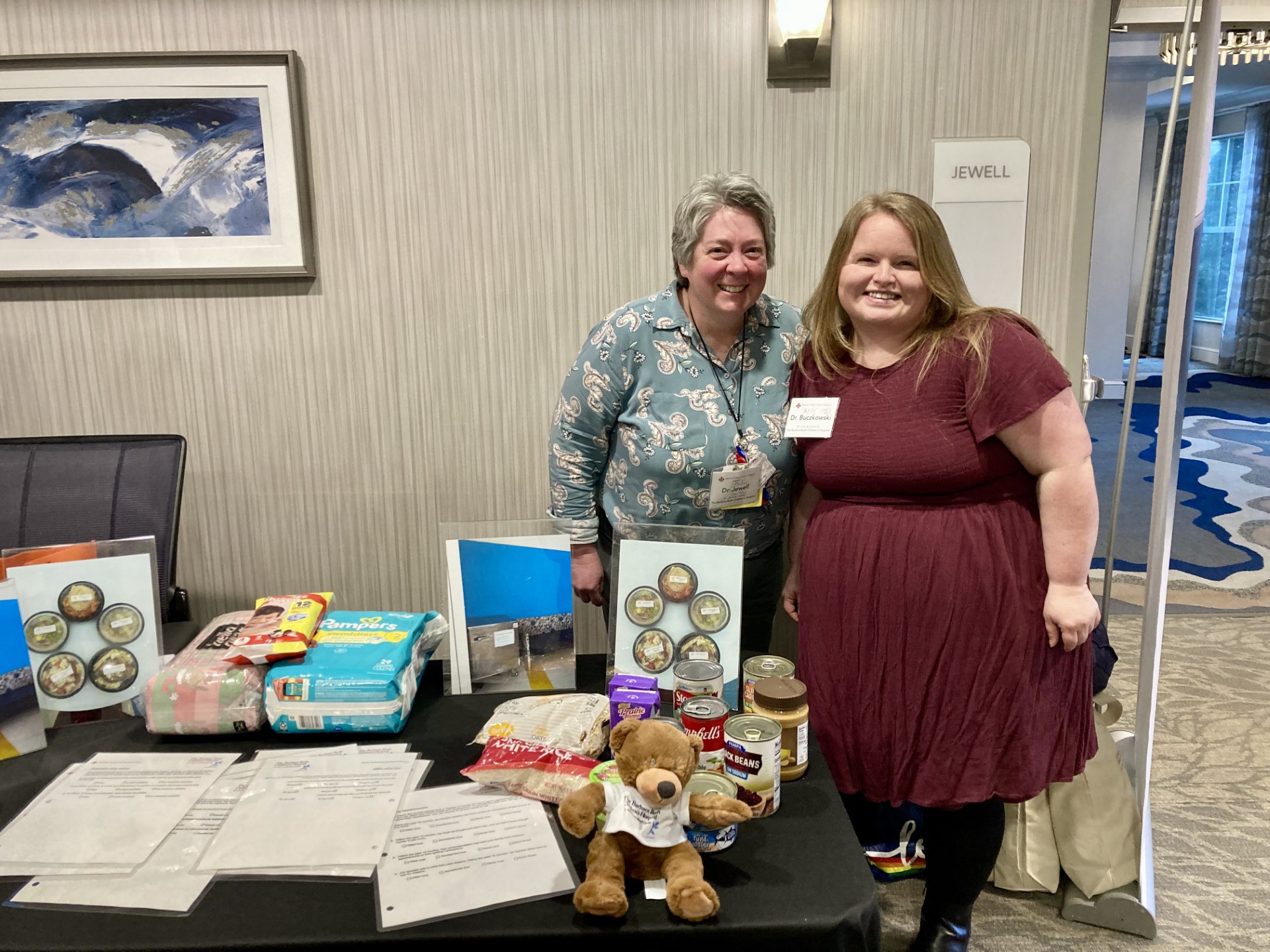Meet Otto
 When expecting parents Landis and Joel escaped NYC during the beginning of the coronavirus pandemic, they were not expecting their trip to Maine to include a lengthy stay at The Barbara Bush Children’s Hospital. Keep reading to hear Landis, Joel and Baby Otto’s unexpected time at BBCH.
When expecting parents Landis and Joel escaped NYC during the beginning of the coronavirus pandemic, they were not expecting their trip to Maine to include a lengthy stay at The Barbara Bush Children’s Hospital. Keep reading to hear Landis, Joel and Baby Otto’s unexpected time at BBCH.
Our son, Otto was born at MMC on 4/30/20 and spent his first 97 days of life at the BBCH Neonatal Intensive Care Unit (NICU). Here is our story.
It was March 2020. We were living in New York City, getting ready to welcome our first child in August. Everything was right in the world. Except in Asia… they seemed to be dealing with some sort of virus or something. By mid-March, we were all dealing with this Virus. In fact, it was a very big deal. We had begun working from home, impending vacations were being cancelled, Broadway and Disneyworld shut their doors. We were learning terms like social distancing and sheltering in place. We thought – hmm.. Maybe we should
head to Landis’ family’s vacation home in Midcoast Maine… that seems like an easier place to spread out. Manhattan is really not set up for putting any sort of distance between yourself and strangers. We’ll go there for a couple weeks and be back by our next OBGYN appointment – perfect. Well we never did get to that next appointment, because during our stay, in the middle of a cozy night on the couch, reading our first baby book together, Landis’s water broke prematurely. We didn’t know what happened in that moment exactly – we went to the local area hospital where they diagnosed the condition as PPROM – premature, preterm rupture of the membranes.
Shortly after learning about the condition, our treating midwife at Miles Hospital in Damariscotta put us in emergency transport to MMC, about an hour south. She said they had a high-risk antepartum unit that would be better able to treat us. When we arrived, we learned more about the condition:
1. It meant that there was a rupture in the amniotic sac and that baby was losing fluid
2. It did not necessarily mean Landis was going into labor, but there was a much higher chance that could happen very soon
3. Babies can live with low fluid or no fluid, but it makes everything harder
4. The rupture meant Landis was much more prone to uterine infection and fetal distress, so that would need to be closely monitored moving forward.
5. Our baby was only 22 weeks gestation at this time, making him just barely viable if he were to
be born then. We would need all the hope, prayers, and advanced medical care we could get if he was to see his way out of this.
What we learned about what some of the goals for treatment would be was the following:
1. Keep Landis pregnant as long as possible – hopefully to 34 weeks (medical reminder that preterm/premature babies are those born before 37 weeks)
2. Because of Coronavirus, patients are not allowed visitors, so this hospital stay of [hopefully] 12 weeks, would be visitorless. Even partners were not allowed.
This date, April 8, 2020, was one of the most difficult days of our lives. We will never forget these initial moments with the staff at MMC. The quality of care was evident. We stayed for about a day in triage trying to understand our options and the risks and benefits to each choice we had in front of us. Doctors came in multiple times throughout their shifts to help explain things to us over and over again because the shock, trauma, lack of sleep, and medical information were too much to process in one conversation. They discussed the medical statistics, but also walked through the real-world versions of them. They stayed way past their shifts. They sat on the bed as we cried with uncertainty. They allowed us time to say goodbye to each other when it was time to transition out of the triage room, and Joel had to go home.
The care continued with Landis’ prenatal stay. Uncertain whether we made the right choice on that first night, the hope and optimism the nurses showed when they spoke about our strong baby boy made us confident that he would succeed, whenever he decided to come into the world. Without any visitors, MMC staff became Landis’s friends and confidants. They shared stories of strong mamas and their babies and preemies that gave us hope, strength and comfort. Even before Otto’s birth and our admission to the NICU, we were getting a taste of the quality of care that goes on there. NICU team members came to visit and talk to us about what it would be like to be a NICU family. Before this, Joel and Landis didn’t even know what a NICU was. And we weren’t exactly sure how to talk about it either. We remember our first virtual tour of the NICU with March of Dimes Liaison, Janelle. We messaged each other after, saying that it made this less scary – we felt hopeful and optimistic for the first time.
The neonatologist who was working the night of our admission, Dr. Allison Zanno, who introduces herself to patients and families as “Allie,” came to visit Landis in the prenatal unit on a slow night in the NICU to check in on her. She pulled up a comfy seat on the floor and chatted with Landis and Joel (on Facetime) about their old life in New York, raising kids, where to get good food in Portland, and what to expect with a premature baby in intensive care. She made us feel human. She made us feel like whenever our son entered the world, she would care for him like family. Ultimately, as it happens with PPROM, Landis did contract a uterine infection 3 weeks after admission. Otto would need to be delivered at 25 weeks gestation. The viability rates are higher at this gestational age than when we were first admitted, but he would still be the youngest and smallest baby on the unit for nearly two months after he was born. This is when hope and prayers (and advanced medical care) needed to kick into high gear.
On delivery day, Joel was finally able to come back to the hospital and was welcomed with open arms by the nurses and doctors who had been with Landis every day. We met the attending neonatologist who would be in the delivery room for Otto’s arrival – Dr. Frehm. He gave us an overview of what would happen in the delivery room and spoke to us about the road ahead. He prepped us for many thing, including: not to expect the baby to cry when he was born, and that we would get to see him but not hold him before he was transitioned to the NICU. He told us about the little plastic bag he would need to be wrapped in to maintain his body temperature. He said he would try to allow Joel to be able to touch his little foot. He spoke about the need of self-care for parents – about the importance of getting home each night to take care of each other, get rest, and show up at Otto’s bedside with our best selves each day. He said it was the best thing we could do for him. He gave Joel a tour of the room in the NICU they had already set up for us – #3754 in Pod 3, our new ‘home.’ And every month, on the 30th, Dr. Frehm made sure to stop by and tell Otto happy birthday!
When Otto was born and Landis was discharged from the hospital, we rented an apartment in Munjoy Hill so we could better commute to the hospital each day. At least one of us would be there every day for the next 97. Every decision that was made was in effort to try and create the closest thing to a ‘womb’ through medical intervention so that Otto could continue to develop on the outside as he was supposed to on the inside. Throughout this time, our NICU team walked us through each medical decision that was made. They answered all of our never-ending questions, repeated things over to us that we didn’t understand, and relied on us as a critical member of that team.
It wasn’t just the medical care they helped us through. It was the emotional support too. When your baby is born at 1 lb, 13 oz, you’re not able to hold him right away. You have to ask permission about how and when to engage with him and you’re also not sure if he will ever be able to come home with you. This makes it really hard to bond with your new child at first. You are unsure of yourself and of him. The nurses helped so much with this. On night 1, we had Nurse Danielle. She explained everything to us and was so affectionate with our little guy – giving him pet names and showing us how, even as he was so small, he was feisty and had a personality. When it came time to hold him for the first time, a few days after he was born, our nurses showed us how to do it. They showed us how they knew he was happy and comfortable based on his vital signs. They encouraged us to read, talk to, and play music for him. They taught us how to touch him without overstimulating him, and eventually how to bathe and dress him (that came after 1 and 2 months, respectively!).
We had primary nurses who were assigned to him more regularly. They knew our preferences and his. Because of COVID regulations, only one parent was allowed to visit per day. And, on top of that, we were 300 miles from home. So more than just being familiar with our family’s ‘preferences,’ the nurses became our caretakers, confidants, and friends. They celebrated with us with each milestone – each gram that turned into a pound, each reduction in his respiratory support, each head ultrasound with no brain bleeds, each successful feed. They felt each and every moment with us. They were our NICU family.
When Joel had to take a precautionary, ultimately negative COVID test, Landis had an impromptu 5-day room-in while he awaited results. This happened to fall on her 30th birthday. The staff shared cupcakes with her, made cards and signs “from Otto,” and stayed up late visiting so she wouldn’t feel so alone. When it was time for discharge, the feelings were bittersweet. We had been waiting so long for this day, but felt scared about being on our own. Our team helped us get ready and build confidence in ourselves and our boy. Our primary nurse, Nurse Lindsey, even came to visit before we left as his discharge ended up planned for while she was out on vacation. Another one of our ‘Primaries’ came in for a NICU photoshoot, as we wanted to make memories of this difficult, but lifesaving and life-changing time. And another one suggested we take a photo with Otto’s favorite stuffed otter so we can watch his growth over the weeks and months. We still take the photos with Ollie Otter to show how far he’s come!
Whenever we tell our story, others usually focus on our displacement as one of the most stressful parts of the narrative. We feel completely the opposite. We feel confident that we would have never received care in such a personal, comfortable, compassionate way as we did at MMC BBCH. From the facilities that were always spotless, spacious, and comfortable, to the preparation for each transition and new stage or step, and most importantly the care from each person who worked with our family. This stop on our family’s journey was never supposed to happen, but we feel so lucky that, if it had to happen, it happened at MMC BBCH. We know the care and compassion that shines out of these walls is not unique to our family and hope that sharing our story can help gain continued support for its longevity.
Forever in gratitude,
Landis, Joel, & Otto
Landis, Joel, and baby Otto ended up at The Barbara Bush Children’s Hospital for a reason. Become a Miracle Maker today by clicking the Donate Now button below to help support Maine’s sick and injured kids, like Otto.
Donate Now





